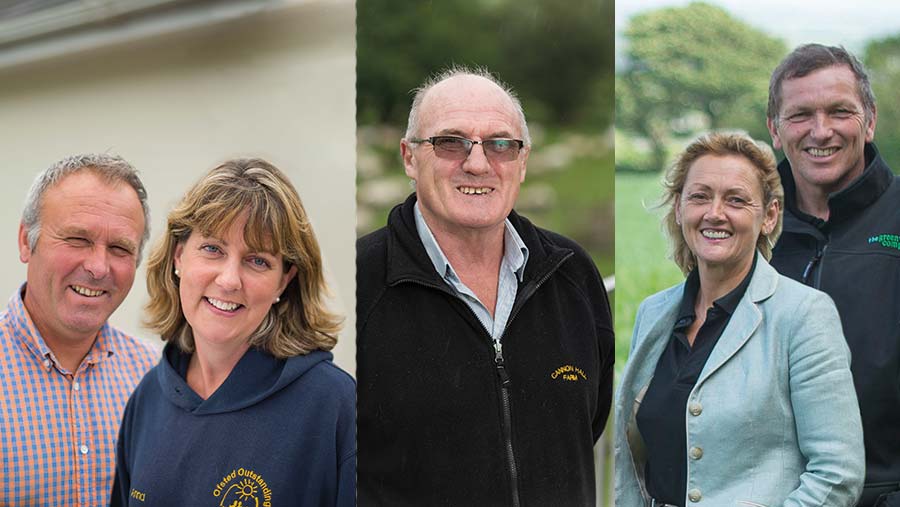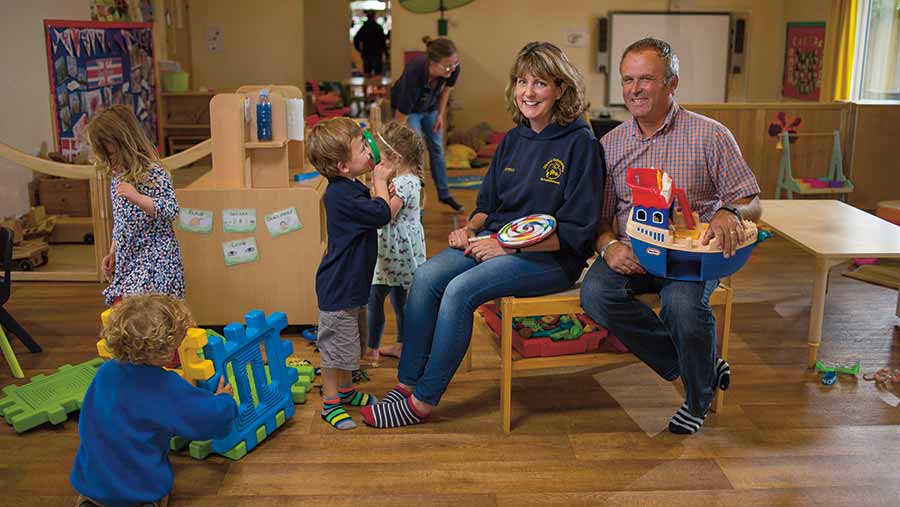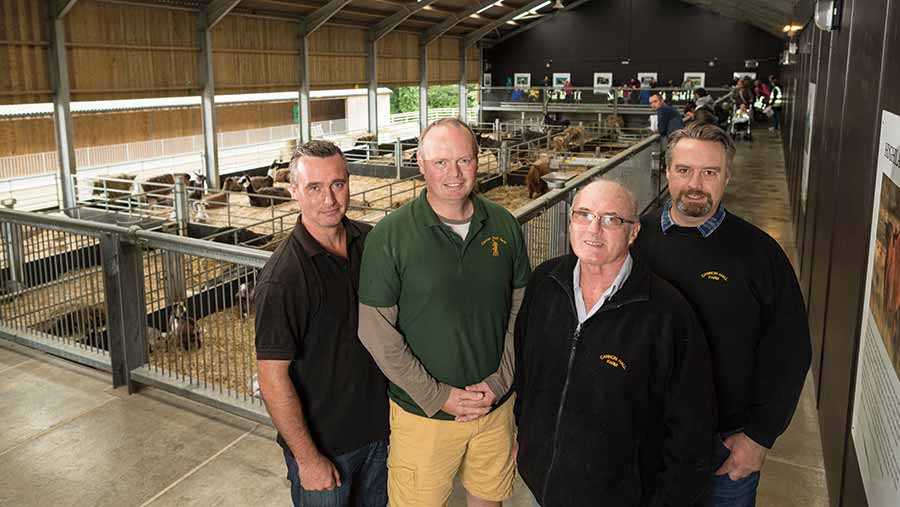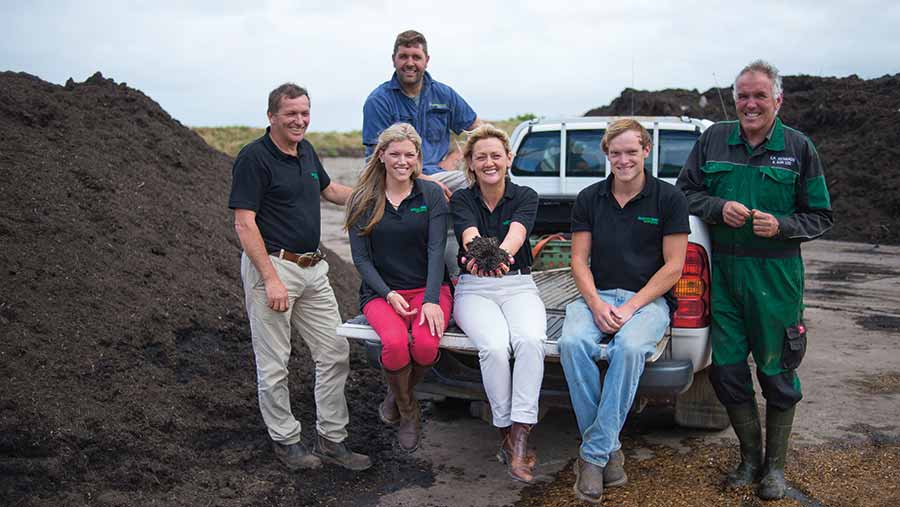2016 Farmers Weekly Awards: Diversification Farmer finalists revealed
The Farmers Weekly Awards celebrate the very best of British farming by recognising and rewarding innovation, hard work and passion for agriculture.
This year’s finalists are perfect examples of how diversifications can add enormous value and stability to an overall farm business.

From left: Anna and Richard May, Roger Nicholson and Felicity and John Richards
See also: Find about more information about the Farmers Weekly Awards
Anna and Richard May
Springfield Nursery, north Devon
Few farmers could say they look after 400 children as well as livestock. But that’s exactly what Anna and Richard May set out to do after the outbreak of foot-and-mouth in 2001.
Just eight weeks after moving into their farm near Barnstaple, north Devon, the couple’s 1,400 ewes and 200 lambs were culled when the epidemic hit a nearby farm.

Anna and Richard May in their popular nursery, which teaches children about farming and the countryside © Jim Wileman
But proving their steely grit, they decided to diversify away from agriculture to generate a steady income so they could rebuild the farm.
Fast forward 15 years, an initial £70,000 diversification grant, and the Mays have created a unique farm-based nursery with 400 children on its books, 40 staff and a steady turnover and profit.
This success has enabled them to gradually restock the 200ha farm (half owned, half rented) to 1,200 breeding ewes and allow eldest daughter Amy to join the business and start a calf-fattening enterprise.
Close attention to detail, professionalism and focus on keeping their customers happy has driven Springfield Nursery’s growth from the first 26 children in the farmhouse’s converted garage to today’s modern childcare provider, rated “outstanding” by Ofsted.
The key selling point is the farm itself – something Anna and Richard were quick to realise and capitalise on. But as well as being of huge importance to the business, the couple are adding enormous value to the local community in terms of farming education.
Sat atop a hill with soaring views and the nursery reception just a few metres from the working farmyard, the Mays offer a variety of outside spaces and activities.
The well-designed buildings allow children to move freely from a colourful indoor area to safe outside areas, which are a child’s dream of “mud kitchens”, willow tunnels and strawberry patches.
The judges liked
- Quality care and service
- Fast growing with high demand and customer satisfaction
- Valuable contribution to local community
- Food/farming/outdoor education is key selling point
- Strong cashflow enabling reinvestment
- Good staff development
- Good environmental credentials
Staff lead nature walks past the commercial sheep flock down to the May’s woods to see the resident pig, alpacas and donkeys. Children learn about food production by collecting eggs and growing and cooking their own vegetables.
Older children – in after-school or holiday clubs – can enjoy toasting marshmallows over campfires since the recruitment of an outdoors activity instructor.
Through good communication and careful, sensible risk management, the Mays have achieved a balance between minimising risks and opening up opportunities to learn about farming.
A moveable hand-washing unit is used to maintain good hygiene and a wellie-swap scheme and provision of overalls mean each child is properly kitted out.
Every morning the family discusses what farm activities are planned so children and staff can either be taken to see it or kept safely away.
A walkie-talkie system keeps all adults in contact and Richard or Amy are called in when more farming knowledge is needed.
“The older children are always asking questions,” says Anna. “We’re creating the farmers of the future. Children are correcting their parents on the farm, saying: ‘It’s not a tractor, it’s a handler’ and ‘It’s not a sheep, it’s a Jacob’.
“They all know Richard,” she says. “He’s a bit like a celebrity – they all call him ‘Farmer Richard’.”
Anna’s leadership and focus on developing her employees and ensuring high-quality child care are reflected in the small staff turnover and regular training.
Farm facts
- 200ha (half owned, half rented)
- 1,200 breeding ewes, 100 caves
- Produce 400 bales of haylage
- Children’s nursery, after-school and holiday club
- 400 children on the books
- 40 staff
- New eco-building with underfloor heating
- 90kW biomas boiler provides energy to nursery
A good management structure of apprentices, full-time care staff, five supervisors and a deputy allows for clear career progression and leadership when Anna and Richard are away.
Excellent organisation is critical for keeping on top of relevant regulations and the heavy administrative burden of tracking each child’s progress. The Mays hold bi-monthly meetings with supervisors, bi-annual accountancy meetings and they employ a cashier and HR manager.
Keenly aware that word-of-mouth has been their best marketing tool, the couple ensure parents are kept happy and informed. Each child has an online profile that staff update daily, which parents can access, and families are invited to on-site fairs and parents’ evenings.
The Mays are continually looking to improve and recently expanded the nursery into a modern eco-building with a grass roof and underfloor heating, which is powered by their 90kW woodchip biomas boiler.
Looking back from the devastation of foot-and-mouth, Anna and Richard say they have learned a lot and now have something better to hand to their own children. “Because there could have been nothing to hand on,” says Anna.
The Nicholson family
Cannon Hall Farm, South Yorkshire
The Nicholson family are masters at getting the most out of their farm and location.
Situated near Barnsley, between Manchester, Leeds and Sheffield, they have seven million people within an hour’s drive of their 76ha farm and have had the vision and tenacity to capitalise on this.
The family has turned its holding into a well-known farm attraction with strong branding, attractive modern spaces and a wide variety of activities, shops and eateries.

Brothers David (left), Rob and Richard (right) with father Roger in the livestock shed with elevated viewing platform © Jim Varney
About 5,000 people visit the farm every week, not including the thousands who eat in the two 300-seater restaurants and the many more who visit the farm shop, deli, bakery and butchery.
It is now an important local employer with 200 staff – something that has been recognised with grants and advice from the local council’s enterprise arm and the regional growth fund.
The judges liked
- Strong branding and marketing
- Fast growth and continual development of new income streams
- Contribution to education, local community, and job creation
- Excellent use of location
- Investment has allowed creative use of space, finished to a high standard
- Impressive use of home-produced meat products
Achieving this required vision and guts early on. When Roger Nicholson was facing financial difficulties in the mid-1980s, he visited Chatsworth Farm park. He realised his farm was next to a country park and came up with a plan.
However, on presenting his farm attraction idea to the bank, he was told to face facts and sell up while he still had some equity left.
Roger ignored the advice, changed banks and renovated some old farm buildings to sell as houses and free up capital. He opened in 1989 with a small café and a few borrowed animals.
Since then the Nicholsons have grown the business at a rapid, but steady rate, adding new income streams every few years.
The business now supports all three of Roger’s sons – Richard, Rob and David – and their families. The Nicholsons cleverly derive value from their livestock in two stages – first as an attraction in their own right and secondly as a wide range of added-value meat products.
Farm facts
- Farm attraction with livestock viewing galleries, two 300-seater restaurants, indoor and outdoor play areas, farm shop and butchery
- Rear 800 lambs and 1,000 piglets and fatten 300 cattle a year
- All meat from livestock sold through the business
- 200 staff
- 76ha owned
They raise 800 lambs and 1,000 pigs and fatten 300 cattle annually. All are butchered, processed and wrapped into Cannon Hall packaging on site, then sold through the farm shop and restaurants plus 40 other local stockists.
Added value is in everything. The huge butchery counter offers enticing products like rolled loin of pork with black pudding and sausage meat stuffing and minted lamb skewers, while the deli sells freshly-baked meat pies and pâtés – all using the farm’s meat.
To ensure the livestock are providing an attraction and meat throughout the year, the Nicholsons have adapted their production calendar.
Two sows are scheduled to farrow every week so visitors can see young piglets, while lambing is timed to coincide with the February half-term holiday.
Most births happen in front of visitors – last year even a cow’s caesarean was performed publicly.
As a rapidly growing attraction with thousands of visitors – including 25,000 schoolchildren a year – the Nicholsons have a strategy to take the health-and-safety risks out of the business, while still allowing visitors to get up close.
A significant investment in a huge roundhouse allows people to watch sheep from an elevated viewing platform, while the modern and airy farrowing houses and cattle sheds – all of which are open to the public – have raised viewing galleries.
The family have a sixth sense for what their customers want and have developed the farm to meet this, making the very best use of space and providing attractions for different ages.
An outside play area is matched by an impressive climbing course for older children and ferret and sheep races also offer daily entertainment.
A new £1.5m modern indoor play area has recently been built, called the Hungry Llama. The huge building has a 300-seat restaurant to keep families coming in the winter months and an express food bar to help busy parents.
Both the Hungry Llama and the newly refurbished White Bull restaurant (also 300 seats), are consistent with Cannon Hall’s refreshed brand – slicker, bigger and better.
The eateries’ cool industrial look – with bare steel pipes, copper-coloured chairs and pale wood – is borrowed from Rob’s visits to London and a bar now allows the space to be used in the evenings too.
The Nicholsons certainly manage to get as much use as possible out of the time and space available at Cannon Hall. A four-day food festival last year attracted 50,000 visitors and a music festival also attracts thousands.
These big events also market the farm and Cannon Hall has more than 90,000 followers on social media.
Although the brothers say it would “be nice to draw breath”, they plan to add a new farm entrance and extend the farm shop.
The Richards family
The Green Waste Company, Cornwall
Technical expertise and business nous is not a thing the Richards family is short of.
Since low milk and vegetable prices in the 1990s forced them to think differently, they have retrained and entered a completely different and highly regulated industry – waste disposal.
Their success, coupled with a clear management structure that puts each family member in charge of a particular operation, has allowed the diversification and the 445ha mixed-farm business to thrive through specialisation.

From left: John, Carolyn, Charles, Felicity, James and Paul Richards on their composting site © Jim Wileman
Their enterprise, the Green Waste Company, now composts 25,000t of green waste a year across two yards, with eight employees, including family members.
Farm facts
- 445ha owned and rented
- 330 dairy cows and followers
- Grows crisping potatoes, cauliflowers, asparagus and forage crops
- Green waste contract indirectly with two councils
- Processes 25,000t of green waste annually across two sites
- Sells compost to 40 farmers
- Employs seven people and supports three families
This includes a new purpose-built area with 1.6ha of concrete pads, which the business was able to finance completely from profits – a significant investment.
The family’s focus on quality and strict adherence to regulations means the Green Waste Company’s compost is certified to the British Standard PAS 100 mark and is sold to 40 local farmers, the Eden Project and the every-day gardener.
It all started when the farm began to struggle to support two families. Youngest brother John and his wife Felicity looked for a diversification that would fit with the existing business.
Felicity’s excellent networking and people skills led her to make valuable contacts, including the head of environment at the local district council.
The family’s tenacity and openness to learning new skills saw Felicity and James embark on a UK tour of waste-disposal sites. They studied at the Chartered Institute of Waste Management and Felicity became a chartered waste manager.
They set up the Green Waste Company in the farmyard with hired machinery and business came in fast from the district and county council.
Next they spent 12 months working with lawyers to tender for a 25-year contract with Cornwall county council. It was awarded to large waste disposal company Suez, but the couple’s local expertise led the company to contract out to them.
The judges liked
- Attention to financial and technical detail
- Open to new ideas
- Well-structured business allowing continual professional development
- Ability to work well as a family
- Contribution to environment and provision of county service
- High return on capital
- Savvy pricing structure related to operating costs
With steely business sense and confidence, Felicity and John negotiated a disposal fee based on the cost of a bundle of indices including fuel and machinery, to be reviewed annually.
This has helped ensure a profitable turnover ever since, with the disposal fee going up every year to date. The farm’s cashflow has also improved, as the Green Waste Company rents the farmyard.
This has allowed the family to invest and plan ahead – both for the diversification and the farm.
“The diversification freed up a lot of management time for the farm,” says John. “We’re now much more specialised and focused.”
The family have transformed the farming business into one that is tightly managed by John’s older brother Paul, with sizeable profits.
The dairy herd, with 330 cows and followers, has been moved to a low-cost, grass-based system with the help of cowman Ben Jacobs, who has been with the family for 11 years, and is now working as a contractor, on his request.
These changes have reduced milking time, mastitis and feed costs and given Ben an opportunity to grow, drill down on costs and improve herd management.
The arable enterprise has become much more specialised and commercially driven, with Paul’s son Charles increasing potato and cauliflower plantings (the farm now grows 35 varieties of caulis) and starting an asparagus crop.
Soil health is carefully managed and compost from the Green Waste Company is used to improve soil structure and fertility.
“Some of our Ps and Ks are getting too high,” says Charles. “That’s not something you hear often!”
A big factor in the success of the Richards’ two businesses, is their ability to work together. They are a well-oiled team, holding regular family business meetings and sharing budgets quarterly.
They have created space for the next generation to come into the business early in a meaningful way and planned their finances so the older generation is independent of the businesses at retirement.
Felicity and John’s daughter Carolyn is the company’s transport manager and continues to study waste management and develop business opportunities. Their son James drives lorries for the Green Waste Company and is managing a new farm diversification, a 450-space park and ride service.
This approach extends to their employees, many who have been with the family a long time and who are offered regular training and flexible hours.
“It’s been an amazing journey, thinking about we have learned,” says Felicity.
The Farmers Weekly Diversification Farmer of the Year 2016 award is sponsored by 4Xtrahands.
 “Each of this year’s finalists have proved their mettle by creating three impressive and unique businesses in the face of adversity. They demonstrate just how important and rewarding diversifications can be in weathering farming’s challenges.”
“Each of this year’s finalists have proved their mettle by creating three impressive and unique businesses in the face of adversity. They demonstrate just how important and rewarding diversifications can be in weathering farming’s challenges.”
Nigel Merriam, director, 4Xtrahands
